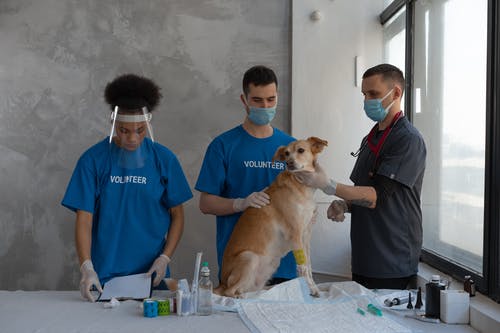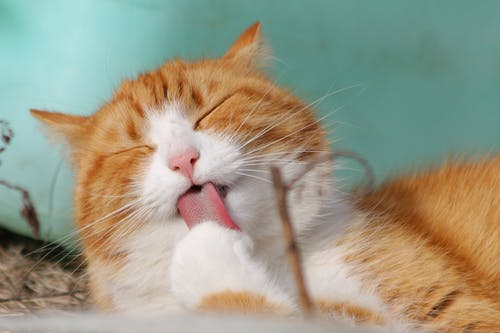Author: Crystal

Feline hyperthyroidism is a common health condition affecting middle-aged and older cats. While it can be worrisome to realize your feline friend is unwell, a solid understanding of this condition can help you recognize the symptoms early and seek intervention from a trusted veterinarian to manage the situation effectively.
What Is Feline Hyperthyroidism?
Feline hyperthyroidism is a common endocrine disorder that affects cats, particularly those in their middle to senior years. It is caused by an overactive thyroid gland in the neck, which produces an excess amount of thyroid hormones (T3 and T4). These hormones are crucial in regulating the cat’s metabolism, affecting various body functions.
With excessive production of thyroid hormones, the cat’s metabolism goes into overdrive, leading to a range of health issues and symptoms. If left untreated, hyperthyroidism can negatively impact the cat’s overall health and quality of life.
What Causes Feline Hyperthyroidism?
1. Age
- Feline hyperthyroidism is most commonly observed in middle-aged to senior cats, typically over the age of 10 years.
- The prevalence increases with age, with very few cases seen in cats under ten.
2. Non-Cancerous Growth (Adenoma)
- Most cat hyperthyroidism cases involve a non-cancerous growth called an adenoma in one or both thyroid glands.
- An adenoma leads to excessive thyroid hormone production, disrupting the body’s normal balance.
3. Genetic Predisposition
- Some evidence suggests that certain cat breeds, such as Siamese and Himalayan, may have a higher predisposition to develop hyperthyroidism.
- Genetic factors could contribute to the development of thyroid gland abnormalities.
4. Dietary and Environmental Factors
- Some studies have linked hyperthyroidism to specific dietary and environmental factors, although the exact mechanisms are not fully understood.
- Exposure to certain chemicals or environmental pollutants may be potential risk factors.
5. Hormonal Disruptions
- Hormonal imbalances or disruptions in the cat’s endocrine system may influence the development of hyperthyroidism.
- The interplay of various hormones could contribute to abnormal thyroid function.
6. Immune System Dysfunction
- Dysfunction in the cat’s immune system might contribute to the development of hyperthyroidism.
- The immune system may mistakenly attack the thyroid tissue, leading to abnormal growth.
7. Thyroid Adenocarcinoma (Cancerous Tumor)
- In rare cases, feline hyperthyroidism can be caused by a cancerous tumor known as thyroid adenocarcinoma.
- This aggressive tumor can lead to uncontrolled and excessive production of thyroid hormones.
8. Iodine Imbalance
- Iodine is essential for thyroid hormone production.
- Imbalances in iodine intake or utilization might influence the development of hyperthyroidism.
Despite extensive research, the exact cause of feline hyperthyroidism remains unclear and likely involves a combination of factors. Veterinarians and researchers continue to study the condition to gain further insights into its origins and better ways to diagnose and treat affected cats.
Symptoms of Hyperthyroidism in Cats
- Weight Loss: Feline hyperthyroidism accelerates the cat’s metabolism, leading to increased energy expenditure and weight loss, despite an increased appetite. Excess thyroid hormones cause the body to burn calories rapidly, losing body fat and muscle mass over time.
- Increased Appetite (Polyphagia): Hyperthyroid cats experience a significant increase in appetite due to the excessive stimulation of their metabolism. They may constantly seek food, act restless around meal times, or try to eat from other pets’ bowls.
- Vomiting: The elevated thyroid hormone levels can irritate the digestive system, leading to occasional episodes of vomiting.
- Increased Thirst (Polydipsia) and Urination (Polyuria): Excessive thyroid hormones influence the kidneys, causing them to filter more blood, leading to increased thirst (polydipsia). Consequently, cats may drink more water and produce larger volumes of urine (polyuria).
- Hyperactivity and Restlessness: The heightened metabolic rate and increased circulating thyroid hormones result in hyperactivity and restlessness in affected cats. They may seem more energetic, exhibit pacing behavior, or be unable to relax.
- Change in Behavior: Some cats with hyperthyroidism may show behavioral changes, such as increased irritability, anxiety, or agitation. They might become more vocal, demanding, or display signs of stress.
- Rapid or Irregular Heartbeat (Tachycardia): The thyroid hormones influence the heart’s functioning, leading to an elevated heart rate (tachycardia). A veterinarian can detect this during a physical examination or by listening to the cat’s heartbeat.
- Poor Coat Condition (Dermatologic Changes): Excessive thyroid hormones can negatively affect the skin and coat, leading to a dull, unkempt, or greasy appearance. Cats may experience dry, flaky skin, and some areas of the coat may appear thin or have hair loss.
- Enlarged Thyroid Gland (Goiter): In some cases of hyperthyroidism, the thyroid gland may enlarge, forming a visible or palpable swelling in the neck region. This enlargement is a goiter, which can be felt during a physical examination.
- Increased Heart Rate and Blood Pressure: In addition to a rapid heart rate, hyperthyroidism can lead to increased blood pressure. Elevated blood pressure can harm the cat’s organs, especially the eyes and kidneys.
- Weakness and Lethargy (In Some Cases): While most cats with hyperthyroidism are hyperactive, some may experience periods of weakness and lethargy due to the impact of the thyroid hormones on their metabolism.
You must consult a qualified vet if you notice any of these symptoms. They can perform tests to confirm the diagnosis and talk to you about their hospital and treatment protocols.
Feline Hyperthyroidism Treatment
- Radioactive Iodine Therapy: One of the most effective uses of radioactive iodine therapy for cats. This procedure involves a small dose of radioactive iodine, which destroys the overactive thyroid tissue without damaging surrounding structures. It’s a highly effective treatment that often cures hyperthyroidism permanently.
- Anti-Thyroid Medication: Oral medication used to control the production of thyroid hormones. Requires regular administration throughout the cat’s life to manage the condition. Effective in controlling hyperthyroidism but not curative.
- Surgical Thyroidectomy: A surgical option for surgically removing the affected thyroid gland(s). Reserved for cats who may not be suitable candidates for radioactive iodine therapy. Requires general anesthesia and skilled surgical intervention.
- Prescription Diet: Some specialized diets are designed to limit iodine intake and reduce thyroid hormone production. It may be used as a part of the treatment plan or as a pre-treatment to stabilize the cat’s condition.
- Medication Management Follow-Up: Regular monitoring of thyroid hormone levels is necessary for cats on medication therapy. Adjustments to the medication dosage may be required to maintain thyroid levels within the normal range.
- Comprehensive Veterinary Care: Regular veterinary check-ups and monitoring of the cat’s overall health and response to treatment. Additional supportive care may be provided to manage any secondary health issues caused by hyperthyroidism.
- Individualized Treatment Plan: The treatment approach may vary based on the cat’s age, health status, and other factors. The veterinarian will discuss the most suitable treatment option for each specific case.
From adopting a balanced diet to regular vet check-ups, maintaining your pet’s health should always be a priority. A comprehensive cat and dog wellness plan can be adjusted for your pet, equipping you with the right tools to proactively monitor your pet’s health. Remember, early detection is key in managing conditions like feline hyperthyroidism.
Conclusion
Feline hyperthyroidism can be scary, but it can be managed effectively with the right knowledge and veterinary partnership. Stay vigilant for changes in your cat’s behavior or physical health, and never hesitate to seek your trusted vet’s help. Their expert advice is crucial in treating hyperthyroidism and setting up a broader pet wellness plan to ensure your furry friend’s all-around health and longevity.

As pet owners, we want to ensure our furry companions receive the best care possible when they are unwell. Pet internal medicine is a crucial component of veterinary care, specializing in diagnosing and treating complex health issues. This article will delve into different conditions treated by internal medicine, various diagnostic tools, and how to determine if your pet would benefit from seeing a specialist in this field.
What is Veterinary Internal Medicine and Its Role?
Veterinary internal medicine involves diagnosing and treating disorders affecting pets’ major organ systems. Veterinarians who specialize in this area, called internists, undergo extensive training to provide comprehensive care for pets suffering from complicated and multifaceted conditions.
Pet Internal Medicine Specialists
Not sure where to find a veterinary internal medicine specialist? A simple search engine query or a talk with your primary veterinarian can help you locate them. They may even have a website with comprehensive information, such as this link to further assist you in understanding their services.
Common Health Conditions Treated with Internal Medicine
Internal medicine treats a wide range of conditions, from immune system disorders to metabolic and gastrointestinal issues. Here are some of the most common health problems addressed by internists:
Metabolic Disorders
- Diabetes 2. Thyroid conditions 3. Cushing’s disease
Gastrointestinal Disorders
- Inflammatory bowel disease 2. Liver, spleen, and pancreas dysfunction
Immune System-Related Conditions
- Autoimmune diseases 2. Fevers and infections
Respiratory and Cardiovascular Issues
Internal medicine also covers respiratory problems, such as asthma and bronchitis, as well as cardiac disorders.
Diagnostic Tools Used in Pet Internal Medicine
Several advanced and minimally invasive diagnostic tools are employed in internal medicine to provide accurate diagnoses and better treatment options.
Endoscopy
Endoscopy uses a flexible tube with a tiny camera to examine internal organs and collect tissue samples.
Digital Radiography
This imaging technique uses X-rays to create detailed images of internal structures, enabling a quick and accurate diagnosis.
Ultrasound
Ultrasound employs sound waves to create real-time images of internal organs, helping to identify abnormalities and monitor ongoing conditions.
In acute situations where your pet’s condition quickly worsens, an emergency vet hospital provides urgent care to help stabilize and treat your furry friend. These specialized facilities are equipped to handle a wide range of medical emergencies requiring prompt and specialized attention.
Chronic Disease Management
Chronic diseases like kidney disease or hematologic issues, such as anemia, need regular monitoring and long-term care plans. Internal medicine veterinarians can help manage these conditions to ensure your pet maintains the best possible quality of life.
As pets age, they may develop health issues requiring specialized care and attention. Geriatric pets, particularly senior cats, may need tailored treatment plans to keep them comfortable and healthy. Focusing on caring for senior cats through proper nutrition, exercise, and regular check-ups are essential for their overall wellbeing.
Who Should Consider Pet Internal Medicine?
Pet owners might consider internal medicine in the following circumstances: 1. Your pet displays undiagnosed symptoms or shows no improvement from standard treatments. 2. You need long-term management of a chronic health condition. 3. Your primary veterinarian recommends a specialist for a comprehensive assessment.
Benefits of Veterinary Internal Medicine
Some key benefits of internal medicine include: 1. Comprehensive understanding of pet health, which aids in accurate diagnosis and treatment. 2. Personalized care tailored to your pet’s specific needs. 3. Access to advanced diagnostic tools for complex conditions.
Identifying When Internal Medicine is Necessary
You might need to seek internal medicine expertise if: 1. Your pet experiences persistent or worsening symptoms that remain undiagnosed. 2. Your pet shows unusual weight loss or changes in behavior. 3. Their energy levels are significantly altered, and their condition does not improve.
How to Find a Veterinary Internal Medicine Specialist
Your primary veterinarian is often the best resource for recommending a reliable internal medicine specialist. Alternatively, you can conduct research on local options and browse online directories and resources to find the right fit for your pet’s needs.
Conclusion
Pet internal medicine plays a vital role in keeping our furry friends healthy, providing specialized care for complex health conditions. By recognizing when to consider a veterinarian specializing in internal medicine, you can ensure your pet receives the most comprehensive and effective treatment possible, contributing to a better quality of life.

Parvovirus is a severe illness that can be fatal to dogs, especially puppies. However, your beloved furry friend can recover from this infection with timely detection, treatment, and proper care. In this article, we will provide expert advice on recognizing symptoms, seeking treatment, and offering proper care during the recovery process as well as guidance on preventive measures. Let’s dive in.
Recognizing Parvovirus Symptoms
Common Signs of Parvovirus Infection
Canine parvovirus is a highly contagious and potentially deadly virus that primarily affects puppies. Symptoms include bloody diarrhea, vomiting, lethargy, and loss of appetite. If you notice any of these symptoms, it’s essential to consult with a veterinarian as soon as possible.
Parvovirus Treatment and Care
Importance of Prompt Veterinary Care
Timely diagnosis and treatment are essential for dogs suffering from parvovirus. Waiting too long can lead to dehydration, severe weight loss, and even death in severe cases. Early intervention with veterinary care increases the chances of a full recovery.
Medications for Parvovirus
When it comes to treating parvovirus, your vet may prescribe antibiotics to combat secondary bacterial infections, anti-nausea medications to control vomiting, and fluid therapy to prevent dehydration.
Supportive Care for a Recovering Dog
While your dog is recuperating from parvovirus, providing a comfortable and stress-free environment is crucial. Keep a close eye on their condition and make sure they stay hydrated. Regarding socialization, you may need to limit their interaction with other dogs to prevent the spread of the virus but don’t neglect their emotional and mental well-being.
Diet Management after Parvovirus Infection
Foods to Feed Your Recovering Puppy
A therapeutic diet is essential for your puppy’s recovery from parvovirus. Stick to the meal plan recommended by your veterinarian, which may include easily digestible foods like boiled chicken and white rice or fat-free cottage cheese and pasta. Avoid overfeeding, as it may result in vomiting or diarrhea.
Transitioning Back to a Regular Diet
As your dog recovers from parvovirus, you’ll need to reintroduce their regular diet gradually. Start by slowly mixing the therapeutic diet with their usual food, and increase the proportion of regular food over several days. This will help your dog’s digestive system adjust without causing any complications.
Exercise and Activity Restrictions
Limiting Exercise During Recovery
Your dog’s energy levels might be low during its recovery from parvovirus. It’s important to limit their physical activities until they regain their strength. Follow your veterinarian’s advice on when to reintroduce their regular exercise routine.
Preventing the Spread of Parvovirus to Other Dogs
To protect other dogs from contracting parvovirus, restrict your puppy’s exposure to public areas like parks, obedience schools, or neighborhood walks for at least a month. Ensure they complete their vaccination series before allowing them to socialize with other dogs outdoors.
Preventing Parvovirus Infection
The Importance of Puppy Vaccinations
One of the most effective ways to prevent parvovirus is to ensure your puppy receives their vaccinations on time. A complete immunization schedule, which includes a pet vaccination for parvovirus, is essential in safeguarding your dog’s health. To learn more about pet vaccines, visit this link.
Regular Veterinary Check-Ups
Routine veterinary visits can help identify potential threats and ensure your dog stays healthy. Be proactive and address any concerns with your veterinarian to maintain your dog’s well-being.
Disinfecting the Environment after Parvo
In the event of a parvo infection, it’s crucial to disinfect your home to prevent further spread. Consult your vet for appropriate cleaning methods and products to help rid the environment of the virus.
Supporting Your Dog’s Immune System
A strong immune system is vital to help your dog combat infections like parvovirus. Feeding them a balanced diet, minimizing stress, and scheduling regular check-ups are all essential in maintaining your dog’s overall health. If your dog requires surgery for an unrelated issue, follow any instructions provided by the vet to ensure a smooth recovery.
Surgical procedures can be taxing on the immune system, so post-operative care is crucial. For more info about pet surgery, go here.
Long-Term Effects of Parvovirus
Once your dog has recovered from parvovirus, it should lead a healthy and everyday life. However, it’s essential to continue monitoring their health, as some dogs may experience complications in the future. Regular check-ups with a reliable geriatric veterinarian in Huntersville will help promptly address any lingering issues.
Managing Interactions with Other Pets and Family Members
Protecting Other Dogs at Home
If you have other dogs in your household, ensure they are up-to-date on their parvovirus vaccinations to prevent the spread of the virus. Introducing new puppies to your home should be done cautiously, prioritizing those that have completed their vaccine series.
Parvovirus Transmission to Humans and Cats
While humans cannot contract canine parvovirus, some strains can be contagious to cats. Ensure that all feline family members are vaccinated against feline distemper to protect them from infection. Maintaining a clean living environment for pregnant women or young children in the household is essential since their immune systems are more susceptible to infection.
The Takeaway
It’s crucial to recognize parvovirus symptoms early and seek prompt veterinary care to ensure the best chance of recovery for your dog. By following expert advice on recovery, care, and preventative measures, you can help your dog bounce back from this challenging experience. Remember to factor in the emotional aspects of recovery, as those play a vital role in the overall well-being of your furry companion. By taking precautions and following the guidance of veterinary experts, you can protect your dog from parvovirus and ensure they lead a happy, healthy life.

With a puppy or kitten in your care, providing them with the best medical care as they grow is essential. This guidelines will help you decide on the right puppy and kitten packages and give an overview of emergency animal hospital options and wellness exams for cats and dogs.
The Importance of Routine Veterinary Care
Ongoing medical care ensures your pet’s overall health and well-being. Regular checkups, vaccinations, and preventive treatments are vital for their development. Regular wellness exam for cats and dogs can help detect any health issues early, allowing for prompt and effective treatment.
Emergency Veterinary Care: When the Unexpected Happens
We all hope for the best, but sometimes accidents and illnesses happen. Knowing the location of your local emergency animal hospital can save crucial time and ensure your furry friend receives prompt care during a crisis. Many veterinary clinics also offer emergency services, so it’s essential to ask your care provider about their services and after-hours availability.
Puppy and Kitten Packages: Vet Care for Your Furry Friend
Comprehensive vet care for puppies and kittens generally includes the following essential services:
- Vaccinations: Protect your pet from dangerous and contagious diseases.
- Parasite prevention and treatment: Ensure your pet is free from internal and external parasites.
- Physical exams: Checking for any signs of abnormalities or illness.
- Spay/neuter: Benefits include curbing undesirable behaviors, preventing overpopulation, and reducing health risks.
- Microchipping: A permanent form of identification to help reunite you with your pet if they become lost.
Puppy and kitten packages can differ from one veterinary clinic to another. It’s crucial to compare what each clinic offers and consider the following factors when making your decision:
- Cost: Understand the package’s total cost and what it includes. Some clinics offer discounts or payment plans for their packages.
- Services offered: Ensure the package covers essential services for your pet’s development, such as vaccinations, spay/neuter, and physical exams.
- Experience and expertise: Consider the veterinarians’ and staff’s qualifications and reputation.
- Convenience: Location, hours of operation, and appointment availability can all impact your decision.
- Reviews from other pet owners: Ask friends for suggestions or search online for reviews of local clinics.
Puppy and Kitten Packages: Customize for Your Pet’s Needs
Puppy and kitten packages often serve as a foundation for your pet’s healthcare, but it’s essential to remember that every animal is unique, and their needs might not be the same as their furry counterparts. You may need to change or add to the packages based on your pet’s breed, age, size, and any existing medical conditions. Talk with your veterinarian to create a tailored healthcare plan for your pet.
Conclusion
Selecting the best puppy and kitten packages for your new best friend. Remember to choose the right package based on cost, services offered, the clinic’s experience and expertise, convenience, and reviews. Remember the importance of regular wellness exams for cats and dogs and knowing the location of a trusted emergency animal hospital in case of urgent medical needs. With dedication and commitment, your furry friend will live a long, healthy, and happy life by your side.

Every pet parent wants the best for their furry friends, and that includes ensuring a healthy and happy life for them. Caring for your pets goes beyond providing them with food, water, and affection; it’s about laying the foundation for their overall well-being through proper preventive care. In this article, we’ll delve into the realm of preventive care for your pets, exploring different aspects that make it crucial and how you can actively work towards achieving it. So, let’s get started and make your beloved pets healthier and happier than ever!
The Importance of Preventive Care
Preventive care is, in essence, the proactive approach toward ensuring the good health of your pets. It reduces the risk of illnesses and long-term health issues by addressing potential problems before they escalate. One essential aspect of preventive care is regular veterinary check-ups, which help in the early detection of any health issues while they’re still in their budding stage. Early diagnosis significantly improves treatment outcomes and saves your pets from unnecessary pain and discomfort.
One vital yet often overlooked aspect of pet preventive care is dental health. Pets, just like humans, can suffer from various dental issues such as gum diseases and tooth decay. Ignoring these problems can lead to severe pain and complications later on, drastically affecting the quality of your pet’s life. To ensure proper dental care, consider taking your pets for pet dental services in Thomasville or your local veterinary clinic, where they can receive regular dental cleaning and a thorough examination of their oral health. Your fresh-breathed four-legged friends will thank you for it!
2. Vaccinations and Flea Prevention
Another critical aspect of preventive care for pets is ensuring they are up-to-date on their vaccinations. Vaccines help protect your pets from dangerous diseases like rabies, distemper, parvo, and kennel cough. Some of these diseases can be fatal, so staying on top of your pet’s vaccination schedule is essential. In fact, you should keep your puppy vaccinations up-to-date for their first six months of life. Aside from vaccinations, it’s also crucial to provide proper flea prevention measures, such as regularly using flea shampoos and maintaining a clean environment for your pets.
3. Regular Exercise and Weight Management
Maintaining an ideal weight and providing regular exercise for your pets is an essential part of preventive care that cannot be stressed enough. Overweight and obese pets are susceptible to numerous health issues like diabetes, heart disease, and joint problems. By ensuring that your pets get proper exercise and nutrients, you not only keep them physically fit, but also ward off potential diseases in the long run.
Vet Lab and Diagnostic Tests
In addition to the previously mentioned preventive measures for your pets, it’s essential to utilize veterinary services that offer comprehensive diagnostic tests. A vet lab can help identify underlying health issues that can be difficult to spot in your pets and provide necessary treatments to ensure their long-lasting well-being. This link can also provide useful tips and guidance on how to ensure proper preventive care and treatment for your pets.
Pet Dental Surgery and Other Treatments
Sometimes preventive care measures don’t suffice, and your pets may require specialized treatment to tackle certain health issues. For example, pet dental surgery is occasionally necessary to alleviate severe pain and address oral complications. Your pet may also need treatments like acupuncture, hydrotherapy, or laser therapy to address specific issues. Ensuring your pets undergo these treatments when needed can prevent further complications and contribute to their overall health and happiness.
Keeping Your Pet Happy and Stress-Free
Finally, preventive care goes hand in hand with ensuring your pets live happy and stress-free life. A cheerful pet is less susceptible to anxiety and stress-related issues, which can adversely impact their immune system and overall health. Make sure to spend adequate time engaging with your pets through play and bonding activities. Creating a loving, secure, and comfortable environment can go a long way in promoting the overall well-being of your pets.
Conclusion
To sum it up, preventive care is crucial for the health and happiness of your pets, and it’s your responsibility to ensure it. By focusing on maintaining your pets’ dental health, keeping up with vaccinations and flea prevention, providing regular exercise, utilizing comprehensive vet lab services, and ensuring happiness and stress reduction, you can pave the way for a healthier and happier life for your beloved furry friends! So, wait no more – start implementing these preventive care measures today, and watch your pets thrive!

As a responsible and loving pet owner, you want the best for your furry family member. One of the most important aspects of maintaining the health and well-being of your pet is ensuring that they receive regular veterinary check-ups.
But why are routine check-ups so crucial for your pet’s health?
In this article, we will explore the different benefits of regular visits to your vet and how these visits can help you detect potential health issues early on, maintain your pet’s overall well-being, and improve their quality of life.
How Can Regular Vet Visits Improve Your Pet’s Health and Well-Being?
Here are some of the key benefits that come with regularly visiting your pet’s veterinarian:
Early Detection of Potential Health Issues
One of the primary benefits of regular check-ups is the early detection and prevention of potential health issues. For example, if you are a bird lover, you should find an avian veterinarian specialist or any other veterinarian with expertise in your pet’s specific species who can identify signs of common illnesses or issues. They can provide the necessary treatment before the problem becomes severe.
Professional Pet Grooming Services
Regular visits to your vet can also help maintain your pet’s overall cleanliness and appearance. Many veterinary clinics offer expert pet grooming services as a part of their check-ups. These services keep your pet looking and smelling great and can also help reduce the risk of specific health issues, such as parasites and skin infections.
Vaccinations and Parasite Management
During a routine check-up, your vet will ensure your pet is up-to-date on all necessary vaccinations. Vaccinations significantly protect your pet from various illnesses and diseases, including potentially fatal conditions. Additionally, your vet will check for parasites and provide appropriate treatments to protect your pet from common parasites like fleas, ticks, and heartworms.
Dental Care and Oral Health
Good oral health is crucial for your pet’s overall well-being, and regular vet visits provide an opportunity for professional dental care. Your veterinarian will check your pet’s teeth and gums for signs of dental issues, such as gum disease, tooth decay, or other oral health problems. Early detection and treatment of these issues can help to prevent more severe dental complications and improve your pet’s quality of life.
Pet Physical Therapy and Rehabilitation Services
Specific therapies may be necessary for pets suffering from an injury, surgery, or a chronic health condition to improve their quality of life. For instance, cat physical therapy can play a vital role in helping feline friends regain strength and mobility after an injury or surgery. Your veterinarian will assess your pet’s needs and work with you to develop a therapy or rehabilitation plan tailored to their condition.
Nutritional Counseling and Weight Management
Proper nutrition and weight management are essential to maintaining your pet’s health. During regular check-ups, your veterinarian can assess your pet’s dietary needs and guide appropriate food choices, portion sizes, and feeding schedules. Additionally, they can help you monitor and manage your pet’s weight, preventing obesity-related health issues.
Final Thoughts
The benefits of regular vet visits go far beyond the simple peace of mind that comes with knowing your pet is in good health. These check-ups offer early detection of potential health problems, expert pet grooming services, vaccination, and parasite management, dental care, specialized therapies, and nutrition and weight management guidance. Regularly visiting your veterinarian is essential to being a responsible and loving pet owner.
So, make it a priority to schedule regular check-ups for your furry companion and ensure they live a happy, healthy, and fulfilled life.

As a pet parent, you want to give your furry family member the best healthcare possible. Veterinary internal medicine is often a complex and misunderstood area of pet healthcare. This guide will help demystify the world of vet internal medicine and provide you with the information you need to make informed decisions about your pet’s healthcare. So, let’s dive in to better understand vet internal medicine and its impact on our beloved pets.
What is Veterinary Internal Medicine?
Definition and Overview
Veterinary internal medicine focuses on the diagnosis, management, and treatment of complex and chronic diseases in animals. It’s a specialized field of veterinary medicine that requires extensive knowledge and expertise to provide the best care for pets with medical conditions. In essence, veterinary internal medicine helps ensure that your pet receives the highest standard of care during times of need.
The Role of Vet Internists
Vet internists, or veterinary internal medicine specialists, undergo several years of additional training after completing veterinary school to become experts in various areas, such as cardiology, neurology, and animal oncology. Their expertise enables them to develop comprehensive treatment plans that address the unique needs of pets with chronic or severe medical conditions.
Common Conditions and Chronic Pet Illnesses
Pets, like humans, can suffer from various chronic illnesses that require ongoing management and care. Some common conditions treated by veterinary internal medicine specialists include:
Gastrointestinal Disorders
Conditions such as inflammatory bowel disease, pancreatitis, and gastrointestinal cancer are examples of gastrointestinal disorders that may require specialized care from a vet internist.
Liver and Kidney Diseases
Pets can suffer from liver and kidney diseases similar to humans, which may require specialized diagnostic tests, treatments, and dietary changes for proper management.
Respiratory Problems
Chronic respiratory issues like asthma, bronchitis, and pneumonia can be debilitating for pets; veterinary internal medicine specialists can provide the necessary treatment and management plans for these conditions.
Endocrine Disorders
Problems such as hyperthyroidism in cats or diabetes mellitus in dogs are examples of endocrine disorders that require ongoing monitoring and treatment under the guidance of a veterinary internal medicine expert.
Urinary Tract Infections
Recurring or severe urinary tract infections can be an ongoing issue for pets, and vet internists can help manage these infections and identify potential underlying causes.
Pet Cancer
Oncology is an essential aspect of vet internal medicine, and specialists in this field can provide pets with cancer with cutting-edge diagnostic options, treatments, and ongoing monitoring.
Infectious Diseases
Veterinary internal medicine specialists can also provide treatment for infectious diseases such as tick-borne illnesses, fungal infections, or bacterial infections that require specialized care.
Diagnostic Tests for Pets
Blood Tests
Blood tests are essential diagnostic tools that can provide valuable information about your pet’s overall health and specific medical conditions.
Imaging Studies, Such as X-rays and Ultrasounds
X-rays, ultrasounds, and other diagnostic imaging studies are essential for identifying issues like tumors, infections, or internal injuries.
Endoscopy
Endoscopy involves using a small camera to visualize internal organs and can help diagnose issues with the gastrointestinal or respiratory tracts.
Biopsies
Biopsies can be performed on tissue samples to confirm the presence of specific conditions, such as cancer, infections, or autoimmune diseases.
Why Consult with a Veterinary Specialist?
The Importance of Specialized Knowledge
Sometimes, our pets require more specialized care than what a general veterinarian can offer. Seeking help from a veterinary specialist, such as an internist vet, ensures that your pet receives the most advanced diagnostic tools and treatment options available for their specific condition. This expertise is essential for managing complex or chronic medical conditions.
Vet Services
An essential aspect of veterinary internal medicine is having access to advanced diagnostic tools and vet services, such as those offered by the All Care Pet Clinic lab. With a skilled team performing diagnostics, your pet’s healthcare providers can better address and manage different health concerns.
The Role of Preventive Veterinary Care
Your pet’s overall wellbeing relies on more than just the treatment of existing health conditions. Preventive veterinary care plays a vital role in maintaining your pet’s health and identifying potential issues early on. Some essential components of preventive veterinary care include:
Regular Checkups and Monitoring
Scheduling regular checkups is crucial for early detection of any medical issues and monitoring your pet’s overall health.
Pet Immunizations
Vaccinations protect your pet from various infectious diseases, such as rabies, distemper, parvovirus, and many others. Ensuring your pet is up-to-date on immunizations can help keep them healthy and safe.
Proper Nutrition
Providing your pet with a balanced and nutritious diet tailored to their specific needs can help prevent health issues and ensure they receive essential nutrients for a healthy life.
Weight Management
Maintaining a healthy weight for your pet is crucial in preventing obesity-related health problems, such as diabetes, heart disease, and joint issues.
Dental Care
Regular dental care, including at-home teeth brushing and routine dental cleanings, can help prevent various dental diseases and prevent other health problems.
The Informed Pet Parent’s Role in Veterinary Internal Medicine
Being an informed pet parent means taking an active interest in your pet’s healthcare and staying informed about veterinary internal medicine. It involves:
Knowing and Recognizing Symptoms of Illness
Learn about the signs and symptoms of common medical conditions in your pet’s species and breed, and monitor your pet for any changes that could indicate a health issue.
Monitoring Changes in Behavior, Appetite, and Activity Levels
Regularly observing your pet’s behavior, appetite, and activity levels can help you identify potential health concerns early on.
Seeking the Appropriate Care When Needed
If you notice any concerning changes in your pet’s health, seeking veterinary care as soon as possible is essential for a proper diagnosis and treatment plan.
Being Involved in Treatment Decisions
Actively participate in discussions with your veterinarian and follow their guidance regarding your pet’s diagnostics, treatments, and preventive care.
Conclusion
Understanding the basics of veterinary internal medicine is critical to making informed decisions about your pet’s healthcare. Being an informed pet parent means seeking the appropriate care, being proactive in your pet’s overall health, and actively participating in their treatment decisions. Ultimately, staying informed about veterinary internal medicine ensures that your pet receives the best possible care throughout its life.

Have you ever wondered which pets are more likely to need specialized care in the form of veterinary internal medicine? Understanding which pets are most vulnerable to various health issues can help you be more proactive in providing the best possible care for your furry friend. In this article, we’ll dive deep into the world of vet internal medicine and explore which pets are most susceptible to needing these critical services.
What is Veterinary Internal Medicine?
Veterinary internal medicine is a specialized field within the realm of animal healthcare, focusing on the prevention, diagnosis, and treatment of diseases affecting the internal organs and body systems. To better care for patients, veterinary internal medicine is further divided into different subcategories:
- Gastroenterology
- Endocrinology
- Hematology
- Nephrology
- Cardiology
When a pet has a complicated medical condition or a condition that worsens despite standard treatment, a specialist in internal medicine can step in and offer a more in-depth understanding of the underlying cause and the best treatment options.
The Most Vulnerable Pets – Who Needs Vet Internal Medicine the Most?
Older Pets
As pets age, they can experience various age-related health issues, such as organ function decline, making them more susceptible to disease. Consequently, older pets often require veterinary internal medicine to manage these chronic conditions properly.
Pets With Chronic Conditions
Certain chronic conditions, like diabetes or kidney disease, necessitate the expertise of an internal medicine specialist. These conditions can be complex to treat and manage, requiring targeted and specialized care.
Breeds with genetic predispositions
Some pets are born with a higher chance of developing specific health issues due to their breed. For example, brachycephalic breeds like pugs and bulldogs may have respiratory difficulties, large breed dogs may suffer from joint problems, and small breed dogs might experience dental issues.
These genetic predispositions make regular checkups with this Greeley veterinarian vital for early detection and intervention.
Signs Your Pet May Need Veterinary Internal Medicine
You might notice certain behavioral changes in your pet that warrant a visit a veterinary internal medicine specialist. These can include:
- Unexplained weight loss
- Chronic vomiting or diarrhea
- Increased water intake and urination.
If you observe any of these signs, it’s crucial to consult a veterinarian to determine the cause and receive appropriate treatment for your pet.
Diagnosis and Diagnostic Tools in Veterinary Internal Medicine
When evaluating a pet’s health, veterinary internal medicine specialists use various diagnostic tools, including:
- Physical examination
- Blood tests
- Urine tests
- Imaging techniques (X-rays, ultrasound, MRI, CT scans)
- Biopsies
- Endoscopy
These diagnostic methods help specialists identify the underlying cause of a pet’s health issue, allowing them to recommend the most effective treatment plan.
Treatment Methods for Pets Needing Vet Internal Medicine
Veterinary internal medicine specialists have an array of treatment options at their disposal, such as:
- Pharmaceuticals (antibiotics, anti-inflammatories, pain relief medications)
- Diet modifications
- Physical therapy
- Surgical intervention
Depending on the pet’s specific condition, an internal medicine specialist may perform a number of vet surgical procedures to treat the underlying issue.
Vet Surgery
In some cases, pets may require surgical procedures to address their health issues effectively. These surgeries can range from routine procedures, such as spaying or neutering, to more complex operations requiring specialized skills and knowledge. A veterinary internal medicine specialist works closely with the surgical team to ensure the best possible outcome for the pet and a successful recovery.
Vet Internal Medicine
For more information about veterinary internal medicine, including how it differs from general veterinary practice and what to expect when working with a specialist, you can click here to dive deeper into this fascinating field.
Preventive Measures to Improve Pet Health
Taking a proactive approach to maintain your pet’s health can significantly reduce their chances of needing serious medical intervention. Some preventive measures include:
- Regular veterinary checkups
- Maintaining a healthy diet
- Exercise and mental stimulation
- Dental care
- Early detection of potential health issues
By regularly monitoring your pet’s health and promptly addressing any concerns, you can help ensure a long and happy life for your beloved companion.
Importance of Vet Internal Medicine for Pet Owners
By understanding the significance of veterinary internal medicine, pet owners can improve their pets’ quality of life and better manage chronic conditions. Early detection and prevention of health issues help avoid complications and unnecessary suffering for pets. Moreover, veterinary internal medicine specialists provide guidance and support on breed-specific challenges, ensuring that pet owners can tailor their care to their pet’s unique needs.
The Bottom Line
In conclusion, understanding who needs vet internal medicine the most allows pet owners to be proactive in providing the best care for their animals. By identifying the most vulnerable pets and being mindful of the signs that indicate the need for specialized veterinary care, you can help ensure your pet lives a happy, healthy, and comfortable life. It’s crucial to work with veterinary specialists, like a reputable Greeley veterinarian, and take preventive measures to maintain your pet’s overall well-being.

Invisalign treatment is a popular alternative to traditional braces, providing a comfortable and discreet method for straightening teeth. However, to achieve desired results, engaging in proper care and maintenance of Invisalign aligners is vital.
In this article, we will explore essential tips for maintaining and wearing aligners and ensuring optimal outcomes.
Proper Wear Time for Invisalign Aligners
For Invisalign treatment to be most effective, wearing the aligners for at least 22 hours per day is crucial. But why is this so important? Consistent and proper wear ensures that your teeth shift according to the treatment plan and can even help accelerate the process. Here are some tips to remember to wear aligners consistently:
- Set reminders on your phone
- Keep aligners in a designated case when not in use
- Always put them back in after eating or cleaning your teeth
Oral Hygiene with Invisalign Aligners
Maintaining oral hygiene with Invisalign aligners is crucial, as they can trap food particles and bacteria between the teeth and the aligner. This makes brushing at least twice daily and flossing once a day essential in preventing gum disease and tooth decay. Additionally, consider using a non-alcoholic mouthwash to keep your mouth fresh and free from plaque buildup.
Dental Cleaning
Regular dental cleanings are essential in maintaining oral health during Invisalign treatment. Visiting a dentist for a professional tooth cleaning in Ewing helps remove plaque and tartar that might have accumulated, ensuring a healthy environment for your aligners.
Choosing the Right Dentist
With Invisalign treatment, it is important to work with a reputable Ewing dentist with experience and expertise in Invisalign technology. They will monitor your progress, provide guidance on aligner maintenance, and adjust your treatment plan when needed. Feel free to ask for recommendations and read reviews before selecting the right dental professional for your Invisalign journey.
Cleaning and Maintaining Invisalign Aligners
Keep your aligners clean to prevent bacterial accumulation. Here are some recommended steps for cleaning your aligners properly:
- Clean aligners daily using warm water and antibacterial soap
- Avoid using toothpaste and abrasive washing, which can damage aligners and create pores for bacteria to thrive
- Consider using an Invisalign cleaning solution for additional cleaning. Proper storage of aligners when not in use also plays a vital role in maintaining quality. Always store them in their designated case to prevent damage or loss.
Diet and Lifestyle Considerations for Invisalign Wearers
Your daily habits can impact your Invisalign experience. Keep these diet and lifestyle tips in mind while undergoing treatment:
- Drink water while wearing aligners to keep them clean and avoid dehydration
- Avoid stain-causing beverages and foods that may discolor your aligners or cause damage
- Be mindful of consuming hard or sticky foods that could damage aligners
Teeth Whitening with Invisalign Aligners
Many people find using whitening toothpaste during Invisalign treatment beneficial. This is because the aligners help maintain contact between the whitening chemicals and the teeth for extended periods, making the toothpaste more effective. However, consult your dentist before attempting any whitening process to ensure it’s appropriate for your case.
Regular Dental Checkups and Invisalign Progress
Staying on top of your dental checkups is important during your Invisalign treatment. Regular visits to your dental professional will allow them to monitor your progress and make any necessary adjustments to your treatment plan. They may also provide guidance on the best practices for aligner maintenance, keeping you on track toward a dazzling smile.
Post-Treatment Care for Lasting Results
Once you have completed your Invisalign journey, maintaining your newly straightened teeth is essential for long-lasting results. Here are some tips for post-treatment care: 1. Wear retainers as instructed by your dentist to help maintain the achieved alignment 2. Continue practicing good oral hygiene, including brushing and flossing regularly 3. Schedule routine dental checkups to monitor the health and alignment of your teeth
Final Words
Maintaining Invisalign aligners and following the tips in this article will help to ensure optimal results, leading you to a stunning, straight smile. Dedication to proper care and consultation with a qualified dental professional will provide the best framework for success during your Invisalign treatment.

When it comes to the health and well-being of our beloved pets, we never want to leave anything to chance. Our furry friends are part of our family, and just like any family member, they deserve the best care possible. However, emergencies can happen anytime, and a reliable veterinary clinic is crucial.
This article will explore the factors you should consider when choosing an emergency veterinary clinic for your precious companions.
How to Find the Right Emergency Veterinary Clinic
Here are some essential factors to keep in mind when selecting an emergency veterinary clinic:
Accessibility and Location
In times of emergencies, every second counts. You need to ensure that the emergency veterinary clinic you choose is easily accessible and located in a convenient area. Think about the proximity to your home, workplace, or other frequently visited areas. Consider the clinic’s availability day and night, as emergencies can strike at any hour.
Reputation and Expertise
When it comes to your pet’s health, you want nothing but the best. Research the reputation and expertise of the emergency veterinary clinic. Look for online reviews, testimonials, and recommendations from friends, family, and fellow pet owners. A reputable clinic will have experienced specialists like a Cordova vet and a knowledgeable support staff capable of handling various emergencies.
Range of Services
Emergencies can come in different forms, and ensuring that the veterinary clinic you choose offers comprehensive services is essential. While some clinics specialize in specific areas, it’s beneficial to find a clinic that caters to a wide range of services like emergency veterinary services in the Cordova and greater Memphis area for cats, dogs and small pets. This ensures that your beloved pet will receive the necessary care and attention no matter the emergency.
Facilities and Equipment
During emergencies, advanced facilities and state-of-the-art equipment can make a significant difference in the outcome for your pet. Look for a veterinary clinic that invests in modern equipment, such as digital radiography, ultrasound machines, and an in-house laboratory. These resources enable prompt and accurate diagnostics, leading to better treatment options.
Staff and Support
A compassionate and dedicated staff is invaluable when it comes to emergency veterinary care, as well as other pet services like cat boarding. Consider the demeanor and professionalism of the staff members. Are they friendly, patient, and knowledgeable? Do they communicate effectively and provide updates during your pet’s treatment or while your cat stays at the boarding facility?
Having a supportive team that understands the unique needs of both emergency care and cat boarding can provide comfort and reassurance during challenging times.
Financial Considerations
While our pets’ health is priceless, it’s essential to consider the financial aspect of emergency veterinary care. Before an emergency occurs, inquire about the clinic’s pricing structure, payment options, and whether they accept pet insurance. Some clinics offer payment plans or discounts for regular clients, which can help alleviate the financial burden during emergencies.
Final Thoughts
Choosing an emergency veterinary clinic is a decision that requires careful consideration. Considering the above mentioned factors, you can ensure your beloved pet receives the best care possible during emergencies. Remember, it’s always better to be prepared and have a plan, so take the time to research and select a reliable emergency veterinary clinic today.
Regarding emergency veterinary services, factors such as accessibility, reputation, services offered, facilities and equipment, staff and support, and financial considerations play crucial roles. By evaluating these aspects and making an informed decision, you can provide your furry friend with the highest level of care in times of need. So, be proactive, choose wisely, and ensure the well-being of your cherished companion.










